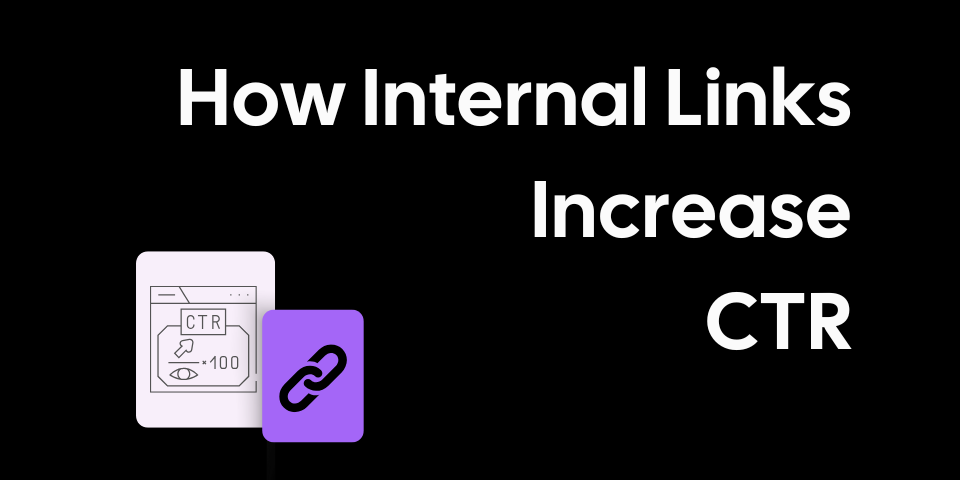
How Internal Links Boost Click-Through Rates
Every website has a rhythm, a flow that either pulls visitors deeper or lets them drift away. Internal links are key to setting that rhythm, shaping how users move from one page to the next. Done right, they guide users naturally, amplifying engagement, boosting click-through rates (CTR), and encouraging exploration. Done wrong, they can feel random or disruptive, leading to confusion and missed opportunities.
Why Internal Links Matter for Click-Through Rates
Internal links do more than just connect pages; they create pathways that encourage users to stay engaged, clicking through more content as they go. When users land on a page that’s well-linked to related content, they’re more likely to find answers to their questions, discover new topics, and move deeper into your site—all of which drives up click-through rates (CTR).
A high CTR indicates that users aren’t just stopping by; they’re actively exploring.
Main product or article page where the user begins their journey
Complementary articles and products that expand on the initial topic
Specific product or resource that matches the user’s interest
45% Higher Click-Through Rate
Designing a Link Structure with Intent
It’s one thing to have links; it’s another to have links that add value.
Start by mapping out where you want users to go: identify key content that complements what they’re already viewing. Anchor text should be direct and meaningful, setting expectations that inspire clicks. Internal links aren’t just dropped in—they’re positioned where they make the most sense in the user’s journey.
When each link has a purpose, it naturally drives engagement, showing users where to go without breaking the flow.
Creating a Seamless Navigation Experience
When done right, internal links don’t feel like interruptions. They should be integrated, guiding users to content that keeps them interested without feeling like a detour. Links to related articles, next steps, or other resources keep the journey moving forward.
The aim is to build a path that’s intuitive, helping users find what they need with ease by creating a library-like structure.
Example: Consider an e-commerce website. When a user lands on a page for summer dresses, internal links could guide them to related categories like: “Top Accessories for Summer Dresses” or “Trending Summer Sandals.”
This approach opens up more options for discovery. Each click keeps them engaged with the site longer, building an interconnected experience where users are drawn deeper into relevant products and content. For the business, it means higher CTR and more chances for conversion, all achieved through smart, purpose-driven linking.
How to Measure Link Effectiveness
Once your links are in place, the next step is to understand what’s working. Analytics tools provide insight into which links get clicks, revealing patterns in user behaviour.
This data shows where users engage most, allowing you to adjust and refine. Measuring results helps you keep the site dynamic, so you’re always building on what best connects with your audience.
Keeping Links Fresh and Relevant
Even the best links need attention over time. Broken links or overused links can interrupt the user experience and diminish trust, so periodic link audits are essential.
Use Analytics Tools to Track CTR on Internal Links
Spot links that drive the most engagement
Regularly audit links to ensure they’re current and functional
Update anchor text as content changes
Tactical Post’s Approach to Increasing CTR
For businesses, creating effective internal links can be time-consuming and challenging to get right. That’s where we steps in. As a SaaS that delivers tailored content solutions, Tactical Postintegrates optimized internal links within each article, aligning perfectly with the specific goals of each business domain—whether that’s building authority, increasing sales, or enhancing brand awareness.
This process is backed by a well-engineered structure within the platform, which analyzes the business’s objectives and inserts the best internal links for each piece of content. By automating this with precision, the platform ensures that links are purposeful, on-brand, and positioned to drive engagement without the usual time and effort involved.
You can try it yourself with a free sample article based on your business domain.
Conclusion: Building a Link Structure That Engages
The right internal linking strategy builds a stronger connection between your content and your users. Focus on links that matter, track the impact, and stay consistent. Over time, this approach turns internal links into an effective tool for boosting engagement and click-through rates.
For those seeking efficiency, Tactical Post can handle the heavy lifting by creating content and optimizing internal links automatically. Discover our 21-article package tailored to your business domain — starting with the first article free — or subscribe to our Beta version to experience it firsthand.